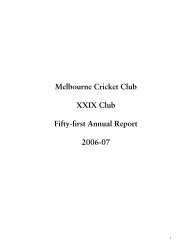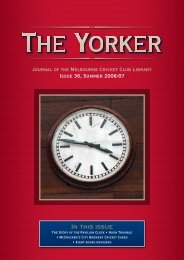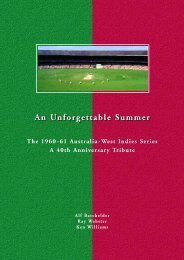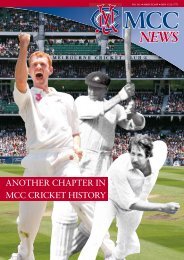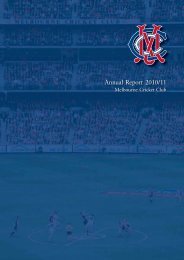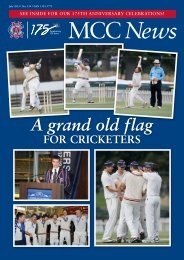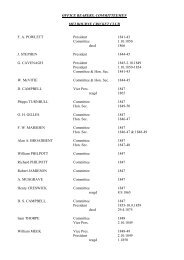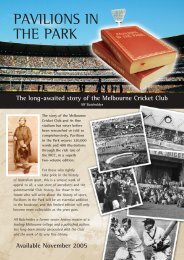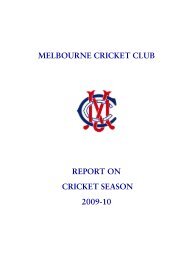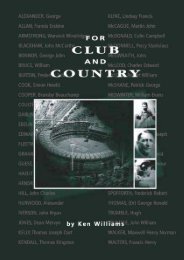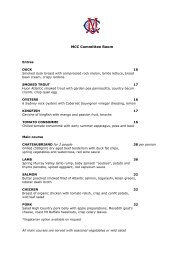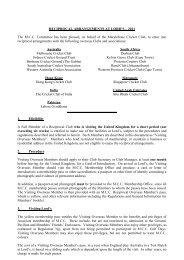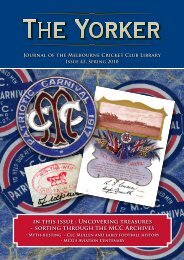our great sporting moments remembered - Melbourne Cricket Club
our great sporting moments remembered - Melbourne Cricket Club
our great sporting moments remembered - Melbourne Cricket Club
You also want an ePaper? Increase the reach of your titles
YUMPU automatically turns print PDFs into web optimized ePapers that Google loves.
CLUB NEWSHE’S ALWAYS BEENA LEGENDDonald Cordner has been anintegral part of MCG life formore than half a century,a legend by any measure, and nowit’s official.When Donald was elevated toLegend status at the Melb<strong>our</strong>neFootball <strong>Club</strong>’s 150th anniversarydinner at Crown in June, thecomparison with an earlier hon<strong>our</strong>could not have been more stark.We refer to Donald’s BrownlowMedal, won in the first week ofSeptember 1946, but not presenteduntil March the following year.The champion Demon ruckmanrecalls being told by Percy Beames ofThe Age that he’d won the medal and apiece appeared in the sports pages nextday. No televised count, no media pack,no black ties or glamorous blondes.As for the presentation, that wasmade at Harrison House in SpringStreet shortly before the start of the1947 season. Donald received a letterabout 10 days before the VFL’smonthly meeting. Could he pleaseattend promptly at 8pm.Still single although engaged toMoyle, Doctor Don was practising atDiamond Creek so to fit in eveningsurgery and make it to town by eighto’clock was quite an effort, but hearrived on time to spend half an h<strong>our</strong>cooling his heels in an anteroom.Finally he was summoned, entering aroom full of 24 VFL delegatesattending a meeting chaired by DrWilliam McClelland who was alsopresident of the MCC at the time.“Player Cordner, you have beenadjudged fairest and best for season1946,” said the chairman.“Congratulations. Here’s y<strong>our</strong> citationand y<strong>our</strong> Brownlow Medal.”“Thank you, sir. I’m very hon<strong>our</strong>edand the citation will hang beside mymedical degree in my surgery atDiamond Creek,” responded Donald.“Long may y<strong>our</strong> interest in <strong>our</strong> gamecontinue, Dr Cordner.Good night.” And that was it. No redcarpet, no media, no Moyle in sight,although once again the press gave it amodest run next morning.Fifty-one years on, Donald was verychuffed to have been hon<strong>our</strong>ed by theMFC at what he described as a verypleasant and dignified affair.He joined some big names at the topof the Demon tree – Norm Smith, TigerRidley and Ron Barassi are amongfootball’s elite.The cricket world lost twoornaments of the game with thepassing of Bill Brown and NormO’Neill recently.Brown was one of the most reveredfigures in Australian cricket during hislater years, a status that he bore with thesame composure, dignity and capacity forself-effacement that characterised hisplaying days, which he ended as one ofhis country’s most accomplished andbest-performed opening batsmen.An elegant right-hander with a superbdefensive technique, Brown possessed thegift of timing and placement of the finestbatsmen, appearing to stroke the ballthrough the field with little effort. Hissignature shot was the leg glance, astroke in which he was acknowledged asthe leading exponent of his era.An unhurried approach, even whenBROWN, O’NEILLLEAVE THE CREASEseemingly in complete command of thebowling, caused Ray Robinson to recordthat Brown was “the most serenebatsman I ever saw play for Australia.”He ended his Test career as a memberof Don Bradman’s 1948 “Invincibles”,having played 22 Tests during a careerinterrupted by the Second World War.He scored 1592 runs at 46.82, withf<strong>our</strong> centuries, while in all first-classmatches he made 13,838 runs at 51.44,with 39 centuries. Before his passing inMarch aged 95, he was Australia’s oldestTest representative.Despite the burden of being anointed asthe next Bradman by the press from earlyin his career, Norm O’Neill became a veryfine Test batsman in his own right. He wasan integral member of the strong battingline up that underpinned the successfulAustralian sides led by Richie Benaudduring the late 1950s and early 1960s.Thick-set and with strong forearms,O’Neill drove with awesome power,most memorably off the back foot whenhe drew himself to his full height andcrashed the ball back past the bowlerwith the straightest of bats.Perhaps his finest innings was a stirring181 in the unforgettable tied matchagainst the West Indies at Brisbane in1960/61. A troublesome knee injuryforced his retirement from Test cricket in1965, by which time he had made 2779runs at 45.55 in his 42 Tests, includingsix centuries.In all first-class cricket, his tally stood at13,859 runs at 50.95, with 45 hundreds.He later became a recognisable voice onABC Radio’s coverage of cricket forseveral seasons before a long battle withlung cancer claimed him in March at 71.8 MCC NEWSJULY 2008



